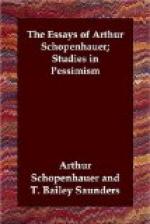To acquire a knowledge of the world might be defined as the aim of all education; and it follows from what I have said that special stress should be laid upon beginning to acquire this knowledge at the right end. As I have shown, this means, in the main, that the particular observation of a thing shall precede the general idea of it; further, that narrow and circumscribed ideas shall come before ideas of a wide range. It means, therefore, that the whole system of education shall follow in the steps that must have been taken by the ideas themselves in the course of their formation. But whenever any of these steps are skipped or left out, the instruction is defective, and the ideas obtained are false; and finally, a distorted view of the world arises, peculiar to the individual himself—a view such as almost everyone entertains for some time, and most men for as long as they live. No one can look into his own mind without seeing that it was only after reaching a very mature age, and in some cases when he least expected it, that he came to a right understanding or a clear view of many matters in his life, that, after all, were not very difficult or complicated. Up till then, they were points in his knowledge of the world which were still obscure, due to his having skipped some particular lesson in those early days of his education, whatever it may have been like—whether artificial and conventional, or of that natural kind which is based upon individual experience.
It follows that an attempt should be made to find out the strictly natural course of knowledge, so that education may proceed methodically by keeping to it; and that children may become acquainted with the ways of the world, without getting wrong ideas into their heads, which very often cannot be got out again. If this plan were adopted, special care would have to be taken to prevent children from using words without clearly understanding their meaning and application. The fatal tendency to be satisfied with words instead of trying to understand things—to learn phrases by heart, so that they may prove a refuge in time of need, exists, as a rule, even in children; and the tendency lasts on into manhood, making the knowledge of many learned persons to consist in mere verbiage.




